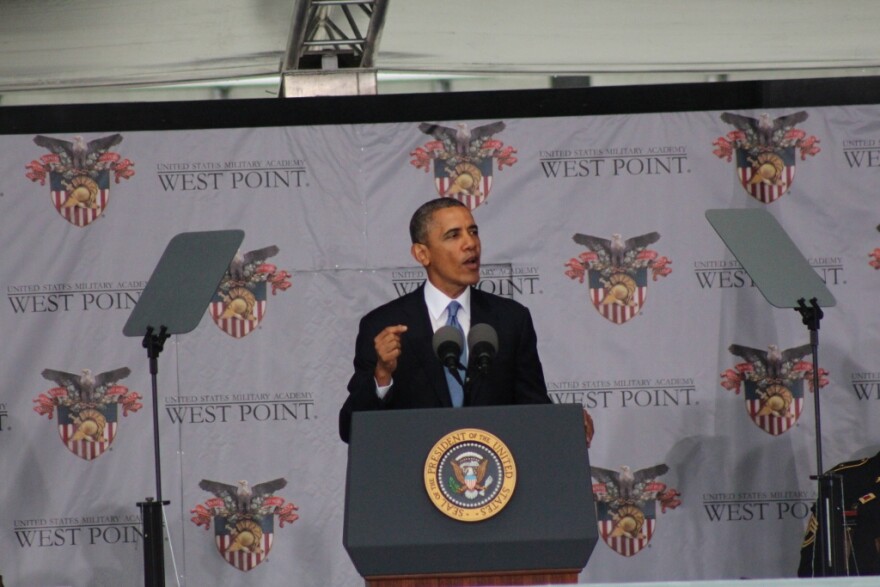President Obama delivered the graduation speech at West Point Wednesday, and with it, a foreign policy change of direction. Now, two Congressmen from the Hudson Valley from different sides of the aisle are weighing in.
President Obama’s speech outlined a shift to more collaboration and less combat on the international stage. He says the U.S. must lead on this stage, and the military is the backbone of this leadership.
“But U.S. military action cannot be the only, or even primary, component of our leadership in every instance,” President Obama said.
Mr. Obama called for a different approach, one that mobilizes allies and partners to take collective action and one that includes diplomacy and sanctions as tools. Here’s Democratic Congressman Sean Patrick Maloney.
“I think the president is right to highlight the need to use our might in ways that don’t always involve putting American kids on the ground in a war situation,” Maloney says. “We don’t need boots on the ground to be a powerful country in every instance.”

Republican Congressman Chris Gibson, a retired Army Colonel who taught at West Point, generally agrees with the president’s overall shift.
“I generally agree with the direction, but I do have points of disagreement,” says Gibson.
One concerns the timetable in Afghanistan. Earlier this week, the president said he would look to bring the U.S. force in Afghanistan down to 9,800 as the U.S. combat mission ends later this year. He then intends to withdraw most of those forces by the end of 2016. Gibson disagrees with this timeline.
“I disagree that we need to keep American forces on the ground in Afghanistan for two more years. I think the time has come,” says Gibson. “We’ve accomplished what we’ve set out to do, not only with regard to al-Qaida, but we’ve also trained the Afghan security forces. We have spent many years now preparing them to take over their own security. And if the president believes there’s more to do on that, I’m willing to look at that. But I would also say that we can have the Afghanis pay for plane tickets and send their non-commissioned officers and officers here to Fort Benning, Georgia, home of the infantry, and we can train them here in the United States.”
He says he want to see the U.S. force back home this year. Maloney, whose district includes West Point, was returning from a four-day day trip to Afghanistan as part of a bipartisan Congressional delegation when Mr. Obama delivered the graduation speech.
“It’s not necessarily to militarily intervene to see our values spread in every instance,” says Maloney.
On the outdoor stage at West Point, Mr. Obama announced he would turn to Congress to authorize the kind of counterterrorism help he envisions.
“I am calling on Congress to support a new counterterrorism partnerships fund of up to $5 billion which will allow us to train, build capacity, and facilitate partner countries on the front lines,” the president said.
Maloney says he needs to see the details.
“I like it in concept and it’s obviously necessary because the threats out there are real and continuing. And particularly when those funds are directed to forming partnerships with others who will also make contributions, I think it’s the right way to go,” says Maloney. “And we obviously need to send a signal that we remain committed to peace and security in places like Afghanistan, but other dangerous places around the world. We can’t disengage from the world, but we shouldn’t be the world’s policeman either. We need to work with our allies in a collaborative partnership of shared costs and shared burdens, and that’s the best way to be successful.”

Gibson agrees the U.S. should not be the world’s police, and has some general ideas about the fund.
“With regard to NATO, with regard to Afghanistan, with regard to other places in the world, I think we need to require these nations to pay for their own security,” says Gibson. “I think there’s a role for us. I think the president’s right on that score. I think we’re not only going to lead the world in terms of diplomacy, commerce, and trade, but with the world’s strongest military as a deterrent to those who would do us harm, we can still play a role in training, in helping shape the professionalism of security forces around the world. I just want to see those nations who are receiving the benefit of that training pay for that training. And it should not come exclusively on the back of the American taxpayers.”
He says the details will dictate whether he will lend his support.






